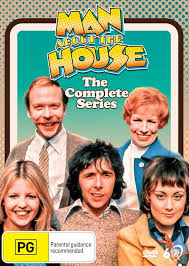The Enduring Charm of Man About the House

Introduction
“Man About the House” is an iconic British sitcom that originally aired from 1973 to 1976. Created by Brian Cooke and Johnnie Mortimer, the show became a cultural phenomenon, capturing the hearts of viewers with its witty humour and relatable scenarios. It centres around Robin Tripp, a young man who shares a flat with two attractive women, Chrissy and Jo, leading to a myriad of comedic situations. The show’s relevance today remains as it explores themes of relationships, gender dynamics, and social norms of the 1970s.
The Show’s Premise
“Man About the House” follows the life of Robin Tripp, played by Richard O’Sullivan, who struggles to juggle his life as a laid-back chef and his romantic interests in his housemates, played by Paula Wilcox and Sally Thomsett. The show cleverly uses the flat-sharing setup to delve into various issues, like friendship, love, and societal expectations. With its engaging storylines and charismatic characters, it became a staple of British television.
Impact and Legacy
The sitcom received critical acclaim during its run, spawning an impressive 39 episodes and paving the way for a successful spin-off series and a film. It left a lasting impact on British comedy and influenced many subsequent sitcoms, showcasing a unique mix of witty dialogue and physical comedy. The chemistry between the cast members contributed significantly to the show’s charm, making it memorable for audiences.
Notably, despite its comedic approach, the show also tackled social issues present in the 1970s, including changing gender roles and the liberation of thoughts surrounding cohabitation. The series was progressive for its time, reflecting the hopes and challenges faced by young adults in a rapidly changing society.
Reappraisal in Modern Times
With the increasing nostalgia for classic television, “Man About the House” has seen a resurgence in popularity, particularly as streaming services have made it accessible to new generations. Modern viewers appreciate the cheeky humour and straightforward depiction of relationships. Social media discussions highlight the show’s relevance, with many fans fondly reminiscing about the antics of Robin and his cohabitating companions.
Conclusion
In conclusion, “Man About the House” remains a significant piece of British television history. Its combination of humour, warmth, and social commentary has ensured its position in the cultural landscape. As audiences continue to discover the show, it serves as a delightful reminder of the comedic excellence that emerged from the 1970s. The legacy of the series encourages viewers to reflect on the evolution of relationships and the complexities of modern living, keeping its spirit alive for future generations.








